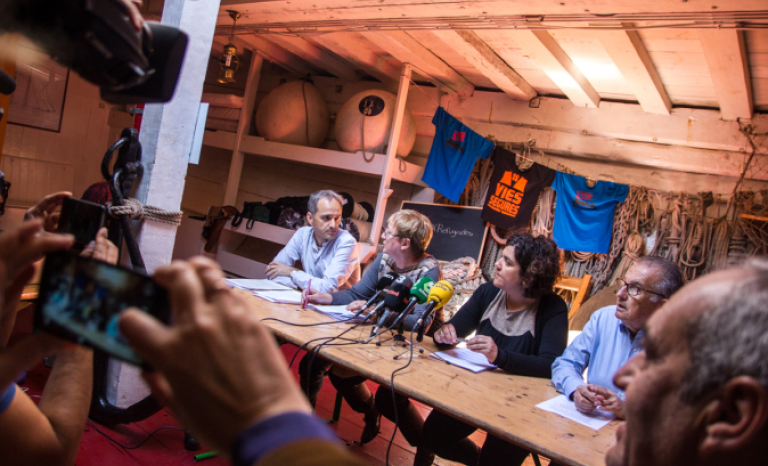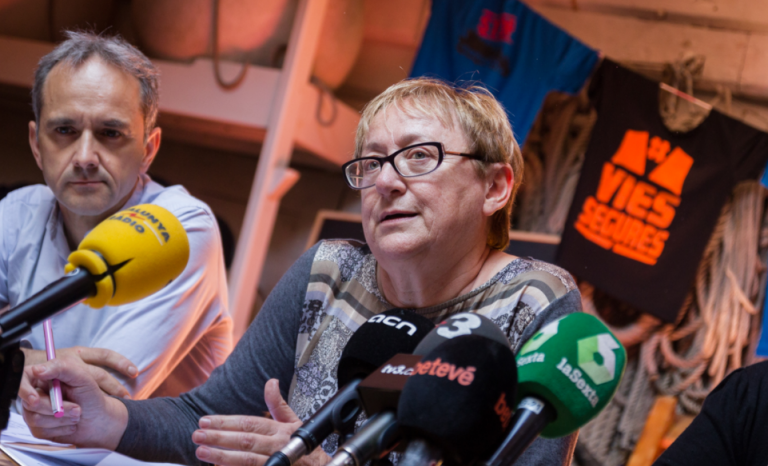Stop Mare Mortum, and Isabel Baixeras at the helm, demands that the Spanish Government adopts precautionary measures to guarantee the relocations imposed from Brussels before the month of September.
The Stop Mare Mortum platform has become the first European nonprofit organisation to start legal actions to demand that the reception quotas are fulfilled. Together with the Barcelona Bar Association (ICAB) Defence Committee, they have served a court injunction to the Spanish Government to demand that it fulfils the commitment imposed from the EU to take in 19,400 refugees coming from refugee camps in Greece and Italy over the course of two years.
So far, it has only received 886. In other words, in a year and a half, it has only fulfilled its promise by 4.75%. It should meet the full quota in the next six months.
The case is lead by the legal expert from Stop Mare Mortum, Isabel Baixeras, who decided to serve a court injunction as the prior and essential step to seek an administrative or judicial review, so that justice could force the Government to adopt precautionary measures.
To what extent are EU decisions binding?
The obligations imposed by the EU are legal provisions also for Spain. The Spanish legal system is not limited to Spanish laws and its Constitution, but must also take into consideration the measures issued by European institutions and those arising from international organisations.
Even when the decision isn’t a law per se, it is a legal provision. The Spanish Constitution establishes that the State is subject to law and justice, precisely to encompass everything.
Whichever the outcome of these legal proceedings, the Spanish State will still have a duty to fulfil its quotas.
Why did you decide to serve a court injunction to the Government?
Before seeking an administrative or judicial review it is compulsory to serve a court injunction. If the administrative review was favourable to us, then precautionary measures could be imposed on the State.
The State should offer places every three months but the pace is not adequate. Time is catching up on them. Before the deadline expires, from Stop Mare Mortum we wanted to warn the Government. We are the first European nonprofit organisation to start legal actions to denounce the State’s failure to comply with its reception quotas.
Through this court injunction we demand that the decisions taken by the EU in September 2015 are respected, with regards to the relocation of refugees in the Spanish State.
Do you think the Government will react to the injunction? What could happen if it doesn’t?
We believe the Government will react. When they receive it, we hope they will react and tell us they have it all organised to comply with the relocation of 19,000 people.
If they don’t reply within three months, there would be an absence of reaction and we would then seek an administrative review to request from the judiciary that the Government is required to meet its obligation. The deadline to seek this review is two months.
A waiting period of three months for a reaction means waiting until the end of July to seek and administrative review. Maybe the precautionary measures will arrive after September, after the deadline imposed by the EU has passed?
It is likely that the whole legal procedure will go beyond September. It is a very slow procedure. The Government should recall that the EU decision states that quotas shall be met “as soon as possible”, an expression that is legal in nature. In other words, it means they are obliged to do this as soon as possible and that they must leave what they are doing to get this sorted.
We can’t ignore that the hurry isn’t about figures or statistics. It’s about people’s rights. The lives of many are depending on this provision.
On average, other EU countries have met 17% of their promise. Do you think this initiative by Stop Mare Mortum might encourage other European nonprofit organisations to follow suit?
We have talked to other associations in Europe, and they’ve shown some interest. However, they need to study how to denounce the failure to comply with the quotas using their legal systems. The court injunction we served is something we did based on Spanish jurisdiction.
What is your opinion on the quota system?
We have a great autonomy of movement, and we would find it tough to be told which country we should go to. The quota system isn’t an optimum solution, it doesn’t grant much freedom.
Organising the relocations based on quotas is not the best solution, but it’s certainly better than living in terrible conditions in a refugee camp.












Add new comment